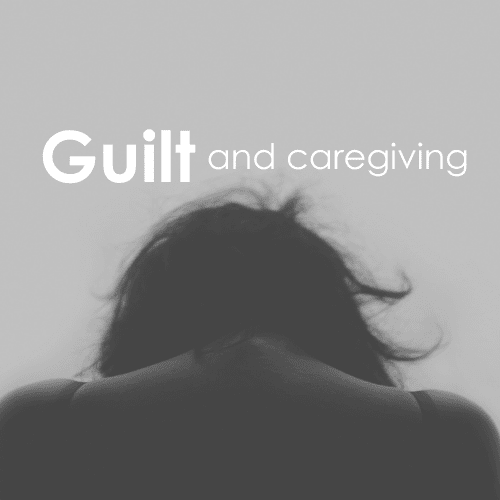Guilt and Caregiving
Monday April 29, 2019

Let’s talk about guilt. Many (if not all) caregivers struggle with guilt. There’s guilt over being embarrassed by your loved one, guilt for wanting to get out of the house and be alone, guilt for taking the car keys away, guilt for moving your loved one into a memory care facility, guilt for not handling a situation well. It’s there in the big decisions and the day-to-day stuff. You may even feel guilty about feeling guilty. What’s a person to do?
You do have a choice. You can recognize and address guilt. OR you can let it tear you apart. You can acknowledge your negative feelings, or you can tuck them away, where they may grow into an even bigger problem.
Let’s bring guilt out into the open and talk about it. Because one of the things that makes guilt feel so awful is that it’s secret. Let’s talk about guilt with these 10 tools for battling the guilt monster. If you’re weighed down by guilt, print this list out, and put it up somewhere you can see it. Be reminded that you are not alone. There is a way forward.
Admit that you are experiencing guilt.
When we ignore it, it grows and causes us to make poor decisions that make the problem worse. Your guilt doesn’t have to control your decisions. Naming the feeling can give you a new mindset and make room for clear-headed decision making.
Be kind to yourself.
Bad days will happen. You will be a mean, grouchy person. You will say unkind things in anger and frustration. Allow yourself some grace for the bad moments.
Apologize and move on.
Especially when it’s something small. If you raised your voice at your loved one or didn’t handle a conversation well, apologize and accept responsibility. Both parties will be better off.
Don’t play the “What if…?” game.
You’re making lots of really hard decisions. It’s easy to second guess yourself. It’s easy to play the “What if…?” game. (What if I would have taken mom to the doctor sooner or checked on her sooner?) The “What if…?” game is toxic. It does nothing but cause more guilt. Recognize that you made the best decision you could with the information you had at that moment, and IT WAS ENOUGH. That is the best anyone can do.
Remember that you cannot prevent the progression of the dementia.
This illness is not your fault.
Remember that your loved one cannot make responsible decisions.
You will have to make decisions for him/her. Do the best you can with the information you have.
Remember that you are not perfect.
You never were perfect, so don’t expect yourself to be perfect now. Everyone messes up in big and small ways.
Take time for YOU.
When you feel guilty about taking time for yourself, remember: “You can’t pour from an empty cup.” In order to care for your loved one, you need to be healthy. Take time to care for your own physical, mental, and spiritual health.
Ask for help.
Is anyone as bad at this as we are? Asking for help is hard! It always helps me to think about it this way: When others ask me for help, I feel great joy in helping them, and I am honored that they trust me enough to ask. Reminding myself that most people are happy to help gives me the courage to reach out to others. Don’t be afraid to ask for exactly what you need.
Find a confidant.
Call your friend, sister, or cousin and talk things out. Sometimes just saying what you feel can help. A good confidant can give you a new perspective. And if guilt is really pulling you down, seek help from a counselor, therapist, or minister.
Last, but not least: If you think you might be depressed, talk to your doctor or a mental health professional.
Don’t delay. Overwhelming feelings of guilt can lead to depression. Be aware, and don’t hesitate to tell your physician.




